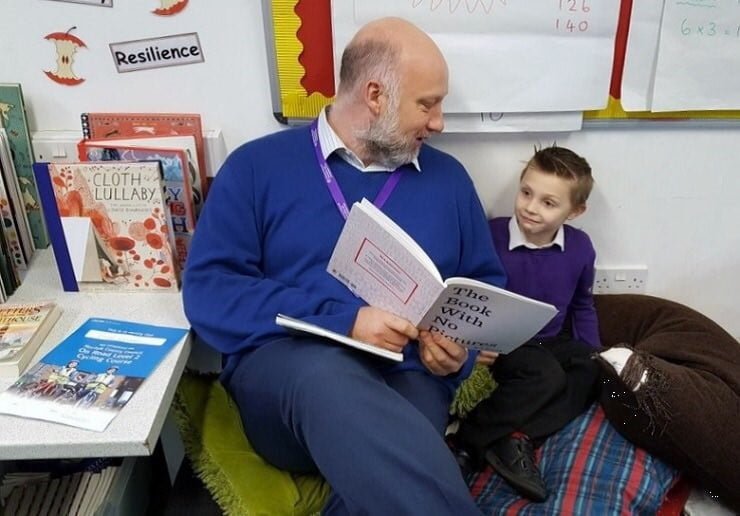The Reading Realm Blog Series: Educators doing extraordinary things
Jon is the winner of the 2018 Egmont Reading for Pleasure Experienced Teacher award, coordinator of the national Patron of Reading initiative and an Empathy Lab advisor.
 Name: Jon Biddle
Name: Jon Biddle
Twitter handle: @jonnybid
Link to blog/website: http://childrenreadingforpleasure.blogspot.com
What is your current position?
Senior teacher and English lead at Moorlands Primary Academy in Norfolk. Currently teaching in Year 6.
When, how and why did you get into education?
In the early 90s, I’d finished university and spent a couple of years flitting between various jobs (bookmaker, decorator, bar manager and so on). One summer, I found myself doing some voluntary work with the Suffolk Wildlife Trust, which resulted in me leading groups during educational visits. I found that I really enjoyed working with children and decided to apply for the PGCE training in London. Literally two days before the training was due to begin, I had a call from the course manager at the Urban Learning Foundation in Newham to let me know that someone had dropped out and a place on the course had just become available. I then spent ten very happy and fulfilling years working in Newham, and have spent the last decade or so teaching in Norfolk.
How do you feel the education landscape has changed since you started in your role?
So many ways! I feel that the overall standard of education has gone up noticeably over the past twenty years, for a huge variety of reasons. However, the obvious flipside to that is the financial crisis that’s currently engulfing schools across the country. I’m not actually sure that ‘crisis’ is a strong enough word when so many schools are laying off staff, drastically narrowing the curriculum and finding it impossible to invest in essential resources, such as books.

What are your earliest memories of reading and writing?
Mr Ramsey was my main teacher in junior school, when I was seven and eight. He read us a children’s version of Gulliver’s Travels which seemed to last forever; actually, with hindsight, it might well have been the full version – it was endless. We did every piece of writing imaginable around the book and spent several months making an army of clay Lilliputians, as well as a life-size sculpture of Gulliver. We also spent a lot of time writing and illustrating poetry, which was absolutely fine by me. My earliest memories of reading at home tend to be based around The Famous Five and various Ladybird books.
How do you try and foster a love of reading in children?
Reading for Pleasure is absolutely central to the culture of our school as we know what a massive impact it can have on children’s life chances. I model reading in the classroom regularly and talk to the children about how important it is to me. We discuss books daily, often having spontaneous class discussions about what we’re all reading. I believe it’s essential for children to be read aloud to as often as possible, as well as giving them daily independent reading time so, however squeezed our timetable is, they’re two things that we always prioritise. In order to keep interest levels high, it’s important to keep a flow of new books, magazines, comics etc coming in to the classroom, which we fund in a variety of ways (including, unfortunately, dipping our hands into our pockets far too frequently). We also have several whole school initiatives such as staff/pupil reading buddies and regular reading assemblies. I’m very fortunate to work with a group of staff who are also passionate about reading.
What has been your most successful reading or writing lesson or activity with children?
When we studied Captain Scott and the race to the South Pole, I managed to get hold of a book called The Last Letters from the Scott Polar Research Institute in Cambridge. It contains the final letters that Scott, Bowers and Wilson wrote home to their family and friends as they were waiting to die in their tent in Antarctica. Sharing those letters in class led to some of the most powerful writing I’ve ever seen. It makes me shiver even now, just thinking about how honest and raw the work was that the children produced.
What advice would you give to parents whose children say they don’t like reading?
Persevere and don’t worry too much (or at all) about what they’re reading. If a child wants to read two hundred Beast Quest books, that’s absolutely fine. Keep gently nudging and pointing out what else is available, they’ll move on eventually. Graphic novels, comics, poems – they all count as reading. It doesn’t matter what the spark is, just keep trying to light it. Time is always a limiting factor, but if you can find enough time to model reading at home, even if it’s sitting for a few minutes with a magazine, that’s great.
Also, if you’re lucky enough to have a local public library or a school library which is open out of hours, get them there as often as possible. The more exposure a child has to books, the more likely they are to find one that they enjoy.

What books do you remember from your childhood? Do you have a favourite?
I remember discovering my mum’s collection of Agatha Christie books when I was about twelve, and working my way through those pretty quickly. I liked the familiarity of the plots, even though I very rarely worked out who the killer was. However, the books that had the biggest impact on me as a child were the Fighting Fantasy series by Steve Jackson and Ian Livingstone. I remember spending numerous evenings sitting with my pencil, dice and squared paper, trying to find my way through the maze in The Warlock of Firetop Mountain (often while Airwolf was playing in the background which, from memory, seemed to be every night).
Which books make you cry?
I often get quite teary when I read books aloud to my class. There’s a passage in The Miraculous Journey of Edward Tulane that I always struggle with; I’ve not made it through once yet without shedding a tear. There’s also a short story by Paul Jennings called The Busker which often causes me to well up. Children usually respond really well when they see that an adult is genuinely emotionally engaged with what they’re reading, so I don’t let it worry me at all. Let them flow!

What authors did you dislike at first but grew into?
I don’t know if I particularly disliked them or just never really got the most from them at the time, but I’ve thoroughly enjoyed re-reading books from my childhood by American writers such as Katherine Paterson, William Steig, Cynthia Voigt and Mildred D Taylor.
What’s your favourite under-appreciated novel?
Many wonderful novels slip through the net, far too many to name. An author whose overall body of work I believe is significantly under-appreciated is Paul Dowswell. He writes absolutely fantastic historical novels for children, usually set in either the First or Second World Wars.
Have you ever experienced reader’s block?
No. I have a break for a couple of days occasionally, but quite often I’ll finish a book and then pick up the next one within a few seconds. I do sometimes give up on a book but it has to be pretty bad for that to happen.
Are you drawn to a particular genre or type of book or do you read a variety of genres?
Do books about the history of cricket count as a genre? Maybe a sub-genre? I read those almost constantly. I love fantasy and science-fiction, as well as historical novels and detective fiction. Actually, I enjoy pretty much anything. I read a huge number of children’s books, but manage to break away occasionally.

What book are you currently reading?
I’m currently reading The Year of Reading Dangerously by Andy Miller. It was recommended by Mat Tobin (@Mat_at_Brookes), and I absolutely love it. There’s a chapter about Middlemarch which made me laugh out loud several times. I’m also reading The Day I Was Erased by Lisa Thompson at school. We read The Light Jar together as a class last year, and the early signs are that this is even better.
Where’s your favourite place to read?
I’m not fussy, as long as it’s reasonably soft and there’s a cup of tea within reach.
Which three books would you recommend to primary school aged children and why?
Obviously an impossible question! Today’s three are:
- The Outlaw Varjak Paw by SF Said
The follow-up to Varjak Paw and slightly better in my opinion. It’s a thrilling journey, with a wide range of wonderful characters. The Scratch Sisters, Cludge, Sally Bones, The Orrible Twins and many more all take on lives of their own in this fantastic book.
- The Miraculous Journey of Edward Tulane by Kate Di Camillo-
A beautifully written book and packed full of emotion. I’ve read it to every class I’ve taught over the past few years and they’ve loved it each time.
- Hatchet by Gary Paulsen

Hatchet by Gary Paulsen
“A book that engages right from the beginning.”
Tomorrow’s selections would probably be completely different, and could well include Wolf Wilder, Bridge to Terabithia, El Deafo, Cloud Busting, Mortal Engines or The Graveyard Book, or possibly some of the fantastic non-fiction books available such as Shackleton’s Journey. I honestly believe that the quality of children’s books being published is incredibly high at the moment, and has been for several years. It’s really concerning that it’s becoming a lot harder for a large number of children’s authors to make a decent living from their writing.
Finally: in one sentence, what does reading for pleasure mean to you?
Reading for pleasure can impact on a child’s path through school but, even more importantly, it can impact on a child’s path through life.



